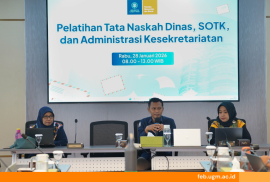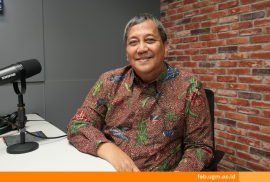Facts and phenomena in the world show that climate change is real. Climate change has a very broad impact on people’s lives. The increase of earth’s temperature changes the climate system that affects changes of the nature and human life, such as the quality and quantity of water, habitats, forests, health, agricultural land, and also coastal ecosystems.
Bringing up the issue, Faculty of Economics and Business Universitas Gadjah Mada University (FEB UGM) collaborating with Star Energy Geothermal, the largest geothermal energy producer in Indonesia, held a Public Lecture on the topic “The Role of Climate Change and Renewable Energy”. The public lecture held online on Thursday (07/30/2020) via the Zoom Meetings Application.
This public lecture discussed the dimensions and aspects that influence the climate crisis. The climate crisis is suspected as a result of human activity in the 20th century, one of which is related to human business activities. The Dean of FEB UGM, Eko Suwardi, M.Sc., Ph.D, said in his speech that in building a business, it is very important to pay attention to the sustainability of the business.
“Discussion on climate change is very beneficial for us and for all individuals and academic community. Understanding of today’s lecture will provide a perspective of natural conservation, existing renewability, and can sustain business sustainability. Cooperation with Star Energy will add to our confidence because Star Energy is a reputable company in terms of new energy. Because business must also pay attention to business sustainability, human sustainability. “, said Eko.
The public lecture session began with a presentation on the climate crisis by Andhyta Firselly Utami as Environmental Economist at the World Bank. Andhyta opened the discussion by bringing up the issue of human consciousness that was less related to the climate crisis. “The impact of the climate crisis is already around us, but most people consider this a natural disaster, not assuming that this is not human error,” said Andhyta.
Another misconception, according to her, is that many people underestimate changing situations, for example related to rising temperatures. In fact, if the increasing of earth’s temperature cannot be suppressed from now on, it can have massive impacts on the damage that will occur in the future. According to her, rising temperatures will have a major impact in the next 60 to 80 years.
She submitted data that 97% of scientists agreed that human activities contribute to global warming. Asia, as an emerging market, is the largest source of emissions in the world. Indonesia received the title of the fourth largest emitter in the world and represented 4.8% of total global emissions in the year. Therefore, according to her, Indonesia has a very important role, especially to reduce greenhouse gas emissions. She criticized the economic outcomes resulting from carbon expenditure in Indonesia. “91% of Indonesia’s emissions from the land and energy sector are forest clearing, land burning and the use of energy, but when it comes to the economy, from every carbon released, Indonesia has very little in economic output,” she criticized.
In fact, the Indonesian Government has now signed the Paris Agreement, a monumental global agreement to deal with climate change, Indonesia is committed to reducing emissions by 29 until 41% in the 2030.
“Sometimes we still find it difficult to balance social and economy, but a sustainable economy must pay attention to the environment first,” she stressed related to the socio-economic conditions in Indonesia.
According to her, it is caused by the climate crisis in Indonesia not being prioritized because this issue is not close to the community. This issue should be a concern for everyone because this issue is very important for the whole community. Regarding the current role of the community, she revealed that the community could choose careers that contribute directly and indirectly to climate-related policies, both in the Private Sector and the Government.
“Our citizen engagement in politics also matters because it can determine the direction of renewable energy policies in Indonesia. For entrepreneurs, can develop a business or a solution that cares about the environment and looks at emissions for sustainability in the future “, she concluded.
Subsequent material was delivered by Merely, Head of Finance and Administration of the Star Energy Geothermal. She conveyed what can be done to deal with the climate crisis and the role of Star Energy to overcome it. She began the presentation related to climatic conditions which according to him now was quite terrible. “If we don’t do something, in the next 15 to 80 years, we will be able to imagine what will happen to the next generation,” said Merely.
The most worrying conditions due the use of fossil energy is the greenhouse effect. According to her, the government must work to reduce this, one of which is by using geothermal energy. “Geothermal energy is non-fossil energy which can reduce carbon emissions. Because, this energy includes environmental friendly, green energy, because it has less emissions than fossil energy, “said Merely.
She revealed that Indonesia has enormous resources in terms of geothermal, if it can be developed it will have an effective impact on reducing carbon emissions and reducing the climate crisis. She regretted that the contribution and consumption of geothermal energy in Indonesia is still quite small, at 8.17%, and geothermal energy generation in Indonesia is also still small. According to her, this is a small category and can’t be said to be optimal, related to Indonesia’s commitment to the renewable energy target on 2025 by 23% and on 2050 by 50%.
“Economic development, environment preservation, and reduction synergy are the main pillars of us for the local community, so that local people have competitive qualities, in order to create an environmentally friendly for Indonesia,” she concluded.
Translator: Laras




